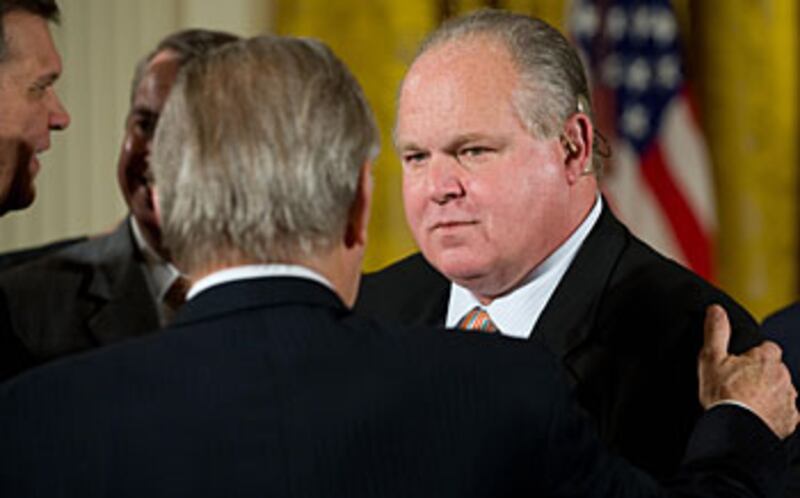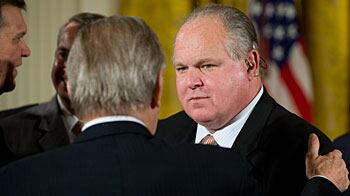
I can picture it now. They’re hunkered down in Rahm Emanuel’s West Wing office watching MSNBC’s 1,089th straight hour of Rush vs. Obama coverage. Carville is on the speaker phone. Begala is wearing an appointment badge and he and Axelrod are on the couch when Gibbs strolls in: “I popped him again at my briefing today.” They are so happy that Operation Rushbo is going as they planned, but they know they need to keep it fresh, so they’ve gathered to strategize about the next steps. Carville pipes in: “The media outlets will start adding Rush to their polls by this weekend. We let that happen and then we point to their polls. That’ll be better than doing another one of our own, now that this cat’s out of the bag.”
Obama relies on a villain to execute his communications strategy. It’s worked well for him, so far. Hillary Clinton was a perfect villain in the primaries.
They are so happy that we’re talking about something other than Wall Street’s “gag me with a spoon” reaction to the administration’s economic policies. They are thrilled that the cables have gone wall-to-wall with Rush coverage so that no one in America will find out about the pork-filled spending bill they are about to sign. They can’t believe their good fortune. “Oh yeah, come to papa,” Axelrod says as he scans the headlines from the left-wing blogs. Begala and Emanuel grin widely. “I’ve gotta go,” Emanuel says. “Figure out how to keep this thing going.”
This is one of the most able political teams in the country. Carville’s wife, Mary Matalin, likened the group of Begala, Emanuel and Carville to a “man’s knitting club,” but these guys are not knitting a sweater vest. They are making a villain. Obama relies on a villain to execute his highly effective communications strategy. Rail against an enemy, assign blame to this villain for everything that’s gone wrong in America, and then position himself as the only one with the correct skills and adequate morals to take on this villain. It’s worked well for him, so far. Hillary Clinton was a perfect villain in the primaries. Obama convinced enough Democrats that she represented “old Washington” and the tired politics of another era. He cornered her on her early Iraq vote, beat her with the change stick and then criticized her personality and questioned her likeability. Team Obama “saved” America from the Clintons. (Funny, then, that Clinton and dozens of her husband’s former advisers are now implementing all those “new” ideas.)
Then, Obama moved on to the general election. McCain didn’t make a very good villain. The whole war hero thing got in the way, so his team came up with a better villain: George W. Bush. Obama talked about President Bush so much that days would go by when he wouldn’t mention his opponent. He strode into office on a message of hope and change, but his demonization of Bush was unprecedented in focus and ferocity.
Now, instead of getting to the vital work of governing this troubled nation, they are shopping for a new villain. It’s a moment of choosing for this new president. Does he do what he promised to do in his inaugural address—demand an end to childish things? Not exactly. The White House chief of staff’s participation in what we now know from news reports by Politico’s Jonathan Martin to be a “coordinated” political operation is breathtaking for its audacity and its smarminess. I can think of no pursuit more childish than an Oval Office-initiated food fight with a talk-radio host.
But aside from diminishing the presidency and exposing a president who promised to elevate the dialogue in Washington to charges of hypocrisy, the strategy has a more serious flaw. It’s incredibly cynical. It assumes that voters are too stupid to know the difference between a talk-radio host and a party’s elected leaders.
Politically speaking, Republicans are in the wilderness, and we know it. I’ve likened our status to the early weeks of an American Idol season. Many of our performances in these early months after our defeat last November will be off-key and lacking in polish. But if we continue to elevate some of our rising stars, a leader will emerge. And looking at the Democrats’ gains from their bruising defeat in 2004 to their decisive victory in 2008, we have a great roadmap for our own recovery.
Nicolle Wallace was senior adviser to the McCain-Palin campaign from May to November 2008. She served President George W. Bush as an assistant to the president, director of communications for the White House, as well as communications director for President Bush's 2004 campaign.





